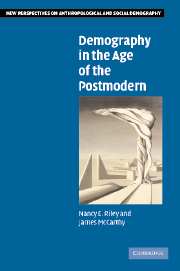Book contents
- Frontmatter
- Contents
- Acknowledgments
- 1 Introduction: why examine demography?
- 2 A brief introduction to postmodernism
- 3 The essentials of demography
- 4 A genealogy of demography
- 5 Demography's place in the social sciences
- 6 Feminist demography
- 7 Postmodern perspectives in demography
- 8 Some final thoughts
- Notes
- References
- Index
1 - Introduction: why examine demography?
Published online by Cambridge University Press: 05 June 2012
- Frontmatter
- Contents
- Acknowledgments
- 1 Introduction: why examine demography?
- 2 A brief introduction to postmodernism
- 3 The essentials of demography
- 4 A genealogy of demography
- 5 Demography's place in the social sciences
- 6 Feminist demography
- 7 Postmodern perspectives in demography
- 8 Some final thoughts
- Notes
- References
- Index
Summary
In recent years, the field of demography has spawned a variety of new ideas, conceptual and measurement frameworks, and theories of demographic change. The debates in the journals are hot with conflicting claims on every issue from questions of measurement and the relative importance of causal forces to the ideological bias of researchers and the entire field.
(Hirschman 1994: 204)The bankclerkly and backroom activities that now make up most of population studies are worthy enough contributions to the quantitative understanding of demographic change but are increasingly divorced from any larger, cumulative social scientific enterprise. They make poor use of the fine vantage point demography offers for multifaceted study of behavioral and social change. And in their direction and reach, they seem ill-suited for treating the kinds of population-linked issues that may soon appear on the public policy agenda.
(McNicoll 1992: 400)This last decade has been a stormy time for demographic theory. Long-held theories and paradigms for explaining demographic behavior have come under fire and even the methods employed by demographers to explain such behavior have come in for sharp criticism.
(Kertzer 1995: 29)These three statements, all written by prominent demographers, present quite different views of the current state of the field of demography. On the one hand, the field is seen as vibrant, with scholars fully engaged in profoundly critical debates that are leading to the development of new theories, new methods, and new knowledge.
- Type
- Chapter
- Information
- Demography in the Age of the Postmodern , pp. 1 - 13Publisher: Cambridge University PressPrint publication year: 2003

